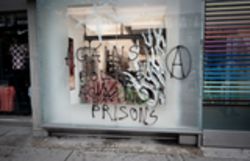Joint lawsuit planned for G20 arrestees
Overwhelmed with calls, Civil Liberties Association is working on suing police forces
Jennifer Yang Staff Reporter
The Canadian Civil Liberties Association says it is considering a joint lawsuit against the Toronto police and other police forces responsible for the G20 mass arrests.
“The CCLA is planning to help people who are seeking compensation to (initiate) a lawsuit in the Superior Court of Ontario,” said Nathalie Des Rosiers, general counsel for the CCLA. “We have a couple of plaintiffs.”
More than 1,000 arrests were made relating to the G20 summit and multiple reports have emerged alleging peaceful demonstrators or even bystanders were caught up in the mass arrests — most notably, at the Esplanade’s Novotel Hotel on Saturday, where demonstrators tried to stage a sit-in, or at Queen St. and Spadina Ave., where a large crowd was boxed in and detained for several hours in the rain.

All arrests this weekend were made under the criminal code and not the Public Works Protection Act, according to the province.
Des Rosiers said the CCLA has been overwhelmed with phone calls and has already collected 75 complaints from people claiming they were wrongfully imprisoned, detained, harassed or assaulted by the police.
Among them is Adam Suska, a 32-year-old supply teacher. After watching a Queen’s Park demonstration on Sunday, Suska was walking towards Bloor St. and Spadina Ave. when police officers stopped him and asked about his black t-shirt.
Following Saturday’s trail of destruction caused by protesters using Black Bloc tactics, there were multiple reports of summit police targeting people dressed in black.
Suska claims police called him a “piece of s—-” and asked for identification, which he didn’t have. He was arrested for breaching the peace and taken to the Eastern Ave. temporary jail, where he was released without charge after eight hours.
Suska said the experience has shaken his faith in police and he now has trouble sleeping. He said he would definitely be open to a joint lawsuit or class-action suit.
“I felt just disgraced and so ashamed,” Suska said. “I shouldn’t have to feel like that just for walking down the street.”
Police Chief Bill Blair has tried to justify police officers’ actions during the summit, saying Black Bloc members infiltrated peaceful demonstrations or that protesters failed to disperse when asked.
Blair has announced an internal police review, but there are growing demands for a public inquiry, with the Public Service Alliance of Canada, Greenpeace and 121 signatories from the York University faculty recently joining the chorus of voices asking for an independent probe. The Criminal Lawyers’ Association is also calling for an independent fact-finder to probe the circumstances surrounding the G20 arrests and NDP critic Don Davies (Vancouver Kingsway) has requested the House of Commons public safety committee be recalled to study issues surrounding summit security.
The provincial government is also coming under increasing fire for its handling of a controversial regulation created under the Public Works Protection Act. Progressive Conservative Leader Tim Hudak deflected blame from the police and said the public’s ire should be directed towards the “slippery and cowardly” Premier Dalton McGuinty for secretly making a regulatory change that police interpreted as giving them more power.
NDP Leader Andrea Horwath also blasted the Liberals for bungling the issue since the Star broke the story last Friday.
“The entire thing is a mess and it’s an absolute absurdity,” said Horwath. “There needs to be an independent review as to what happened.”
Of 1,090 people detained over the G20 period, 714 were charged with “breaching the peace” and taken into custody, according to police spokesperson Const. Tony Vella. All were eventually released unconditionally. (Some 113 were released at the scene of the arrest with no charge.)
According to section 31 of the criminal code, officers can arrest anyone found to be “committing the breach of the peace or who, on reasonable grounds, he believes is about to join in or renew the breach of peace.”
But according to criminal lawyer Paul Calarco, there is “no legitimate basis” for many of this weekend’s arrests.
“Wearing a black t-shirt is not any basis for saying reasonable grounds (for arrest),” he argued. As for arresting peaceful demonstrators en masse, “that is not a proper use of Section 31. That is an intimidation tactic,” he said.
“Standing on the sidewalk and exercising your constitutional rights is not a breach of the peace.”
A further 263 of those arrested were charged with criminal offences — some because they had pocket knives or similar common items in their backpacks — and were sent for bail hearings.
Some people who were arrested will probably argue their Charter rights were violated, said Jonathan Dawe, criminal lawyer with Sack Goldblatt Mitchell. He pointed to reports of people being denied their right to legal counsel or to not be arbitrarily arrested or detained.
“I can’t imagine how (police) could not have known that what they were doing is unlawful,” Dawe said. “I’m shocked at what seems to have been a wholesale decision on the part of the police to abandon the Charter.”
Source: http://www.thestar.com/news/gta/torontog20summit/article/830747



